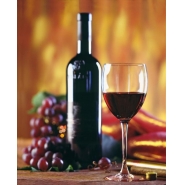1. What is Red Wine extract ?
Red wine extract originates from red wine through a series of condensation and dehydration process prior to give a powdered form which is rich in antioxidants-rich substances such as polyphenols and flavonoids. The extract also contains high amount of resveratrol, which is a compound that occurs naturally in plants and is considered part of their natural defense system, protecting delicate tissue from illness and disease.
2. How did people discover Red Wine extract ?
In 1991, 60 Minutes broadcast a story that dealt with a phenomena we have come to know as the “French Paradox” which figured out that coronary heart disease rates among French males is significantly lower that the rate for US males when the French consume much more saturated animal fat than Americans. Resveratrol in Red Wine Extract is the key answer to it.
3. Where can we find it?
Our Alcohol-free red wine extract is sourced from world-known red wine paradise – Chile, which shares all the essentials of a quality Chilean red- full-bodied, intense flavors and excellent longevity. Chilean red wine honorable history begins since the mid-sixteenth century and it is well known by winemakers and scientists worldwide for their nutrient-dense properties. Extreme weather conditions throughout all seasons forces the plants to produce up to the world class Chilean red wines which supply a high levels of antioxidants.
4. What are the clinical implication of Red Wine extract ?
Cardiovascular protection
Scientists believe the key to the healthful benefits of red wine lie in the antioxidants, flavonoids, and phenolic compound. Red wine extracts will maintain the health of capillaries, through which the blood delivers nutrients to individual cells and carries away waste products. It is believed to improve circulation, which benefits both cardiac and cerebral function.
Anti-oxidation
Red wine extracts promote antioxidants due to phenolic rich characteristics. Phenolics are not only important antioxidants in wine preservation, in human body, it can limit LDL peroxidation, they restrict one of the critical early stages of atherosclerosis. This probably results from the inhibition of lipoxygenases, as well as the scavenging of free oxygen radicals, such as superoxide and hydroxyl radicals and by chelating iron and copper. In addition, tannins subunits appear to protect other cellular components from oxidantion.
Additional potent antioxidants in wine are flavonols, such as quercetin and resveratrol. Resveratrol, a phenolic found in a high concentration in red wine extract, inhibits the expression of cyclooxygenases. Flavonoids have been shown to possess various mechanisms of action, some directly quenching free radicals. Flavonols also strongly restricts the action of the common dietary carcinogens, heterocyclic amines. Also, Resveratrol increase nitric oxide levels, it helps to relax and dilate artery walls, allowing blood to flow more freely to the heart and the brain.
Anti-neurodegeneration
Research (2008) from UCLA and Mt. Sinai Schools of Medicine have indicated that red wine extract can be protective in cases of Alzheimer's disease. In animal models, the neurology team studied beta amyloid, the proteins that build up in Alzheimer's affected brains, and found that the polyphenols (resveratrol) from Red Wine-Grapeseed extract blocked precursor proteins from sticking together to form the toxic beta amyloid protein, as well decreased the ability of the beta amyloid protein to damage neurons. This worked when treating the neurons prior to toxic damage and suggested that administration of the compound to Alzheimer's patients might block the development of these toxic aggregates, prevent disease development and also ameliorate existing Alzheimer's disease.
Anti-cancer
In a study from the University of Kentucky Graduate Center for Toxicology and published in the January, 2009, issue of Clinical Cancer Research, a journal of the American Association for Cancer Research, scientists found that Red Wine extract stimulated leukemia cells to commit suicide, a process called cell apoptosis. A number of studies have already shown Red Wine extract has an effect on skin, breast, bowel, lung, stomach and prostate cancer cells, which is likely due to the presence of proanthocyanidins, a family of antioxidant compounds. Red Wine contains a number of antioxidants, including resveratrol, which is known to have anti-cancer properties, as well as positive effect on the heart. In lab experiments, within twenty-four hours, 76% of leukemia cells exposed to the extract were killed off, while healthy cells were unharmed. These results could have implications for the incorporation of agents such as Red Wine extract into prevention or treatment of hematological (blood) malignancies and possibly other cancers.






























